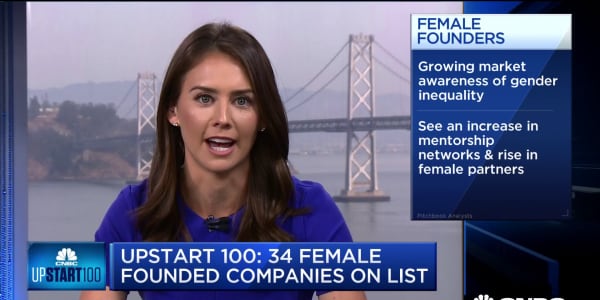Nobody likes waiting in line at the checkout counter, whether it is waiting for a human cashier or one of the newer, self-checkout registers where patrons often struggle with the scan-and-go technology's hiccups. It's one more unsolved issue for an already embattled retail store sector — and one more opportunity for Amazon.
The cashierless-store concept popularized by the Amazon Go store — which Jeff Bezos' company has major plans to expand across the U.S. — allows customers to pick up all of the items they need and then simply walk out the door. Skipping the checkout entirely, shoppers are sent a receipt of their purchases through the Amazon Go app (a necessity to enter) after leaving the store.
While Amazon may be the biggest name in the market, it isn't the only player. Two tech start-ups, AiFi and Grabango, are working on autonomous systems for big retailers doing battle with Amazon in a mounting checkout-less technology war.
"When you have a strong leader in the market like Amazon, it creates a level of cultural awareness that can help kind of set the market," said Andrew Lipsman, principal analyst for eMarketer. "And then you have other providers who are enabling the technology to compete with Amazon, so very quickly you can see how the whole market will move quickly over the next two or three years."
Walmart is not ceding this new shopping approach to Amazon, either, as the retail giant has been testing technology, including its "fast lane" app-based checkout in Canada, and other systems being tried within its Intelligent Retail Lab effort. Walmart's Sam's Club has already successfully deployed scan-and-go shopping technology.
New competition checking in
Grabango, the brainchild of Pandora co-founder Will Glaser, is already pairing with grocery store brands across the country — among them, Giant Eagle, a Pittsburgh-based grocer that was the first to announce it is testing Grabango technology in one of its stores.
Founded in 2016, the idea for Grabango, a CNBC 2019 Upstart 100 list company, was sparked by developments taking place in the autonomous vehicle industry and increasing applications of machine learning and computer vision. In the long lines that inconvenience customers in large grocery and large consumer store chains, Glaser saw another place to deploy these computer advances.
More from Upstart 100:
Kevin Durant and other NBA stars are funding a start-up with their millions to challenge TV sports
Ant colonies inspire the new warehouse design of the future
This start-up aims to break internet monopolies and deliver 5G broadband for $49 a month
According to Grabango chief business officer Andrew Radlow, computer vision is a key distinction that separates Grabango from Amazon Go. Go stores use scales, shelf cameras and sensor technology to track items when they are taken off the shelf. Grabango's computer vision technology uses small cameras that track when each product in the store is taken or replaced. These cameras are hidden inside a casing in the ceiling, similar to a fluorescent light fixture, called a G-rail. The technology automatically tallies up your items as you move through the store, enabling you to pay through the Grabango app when you leave the store, or paying the cashier without needing to remove your items.
"You no longer have to put items on the conveyor belt; you no longer have to wait for somebody to scan them out; you no longer have to wait to rebag," Radlow said. "So literally 80%-plus of all of that time-consuming friction is eliminated. ... I think there is a universal agreement that this is the new 21st-century shopping experience."
I think there is a universal agreement that this is the new 21st-century shopping experience.Andrew RadlowGrabango chief business officer
AiFi is another 2019 CNBC Upstart 100 list company that utilizes this type of technology. The company was founded in 2016 by married couple Steve Gu and Ying Zheng. Both Zheng and Gu worked for Apple and Google before starting their own tech business.
AiFi uses a "sensor fusion" technology that combines data from sensors to increase the accuracy of tracking a product, and also uses camera technology to track what items are removed from the shelf by which individual.
"We have a web of cameras that are being used to track individuals in the space time domain," said Gu. "As a result, we are able to track [thousands of] people in small and large stores, being able to follow their ID in the entire shopping journey."
When you enter a store with AiFi technology, you scan your phone using Apple Pay or Google Pay, which lets you pass through a front turnstile. Once you pass through the turnstile again to leave, it charges your card based on the groceries you've taken.
Gu said the technology does not involve facial recognition but instead associates general physical features — like clothing color, hairstyle and height — to each individual in the environment, differentiating between one person and the next. Combining the cameras and shelf sensors, it can accurately tally each person's grocery list.
Near the exit of the stores is a screen that displays the customer's grocery list to them as they leave, free of the checkout process.

AiFi said it has five retailers that are using the technology in the U.S., though it declined to name the companies. In Europe grocery store chain Albert Heijn in the Netherlands, which operates 889 stores, and Polish convenience store chain Żabka, which operates more than 5,400 stores, are among its partners.
Additionally, AiFi has eight "nanostores" across — located in Europe and in Shanghai — that are currently being tested. Companies can brand these nanostores, which are 8 ft x 20 ft miniature stores available 24 hours a day. So far, access is limited to media and the employees of the company branding the store. European convenience and food provider Valora, which has 2,800 outlets across Europe, plans to open a nanostore in Switzerland to bring the brand to locations with few convenience offerings, though to date no locations have been selected.
Suppliers say an automated store of a 7-Eleven size (similar to AiFi's nanostores) would cost anywhere from $100,000 to $300,000, whereas in the past it would have cost millions, according to a recent article from the Wall Street Journal.
"I do think that those automated stores, especially the small format, will become very widely popular due to its accessibility, very easy to move, and very easy to fit into different places," Gu said. "I think it also changes the notion of how people can shop."
With more than 30 employees, AiFi is still in the start-up phase and is looking to continue to grow its technology and the company.
Securing robot stores against shoplifters
While the goal of AiFi and Grabango is to eliminate lines, there is the added benefit of protecting the stores against shoplifting. According to a 2018 National Retail Federation survey, American retailers lose nearly $50 billion annually to theft. Shoplifting accounts for most (36.5%) of those losses.
"When you know every product in the store and you track the product as they're selected and they make their way toward the exit, you know where every product is, and you know which product is paid for and which ones aren't," Radlow said. "So you have a very strong accounting for the movement of merchandise, and so the concept of theft really vanishes because you're constantly charging for products in an automatic fashion."
Lipsman said the automated process does make it difficult to steal. "The technology knows to automatically deduct. It is monitoring you to know what you take off the shelf, so you really wouldn't be able to steal, because the payment is automatic."
The caveat is that if the system were to fail, it would be open season for shoplifters.
Grabango's system protects against this risk by being network redundant, meaning that in the case of a network outage, the store would run on a "backup system."
AiFi says it is adding similar theft protection.
Gu said that what we think of today as stealing will be the act of buying from an automated store, "because we have so many cameras in the store that will be able to track who is grabbing what in real time."
Cashless store backlash
Checkout-free technology has attracted a political backlash with concerns that it can develop into a form of economic injustice, leaving behind those who do not have access to a bank account or credit card and must use cash. Legislation in New Jersey and Philadelphia has banned cashless checkout systems, and similar bans are being considered in New York City.
"It's important not to discriminate against any consumer," Lipsman said, and these autonomous stores need to have a cash option.
Grabango and AiFi do have measures in place to accept cash. Grabango's system allows you to pay with cash at a cashier: Since the technology knows which items you've picked up, you can hand the cashier money without needing to scan and rebag your items.
With AiFi's turnstile technology, you use cash to fund a card at a kiosk, swiping to gain access to the store. Then the purchase amount is deducted from your card once you swipe to exit the store.
Amazon announced in May that its new Go store located in New York City would accept cash. If a customer wants to pay with cash, they can speak to a store associate who can scan them into the store and check them out when they are done.
There are also concerns that the technology will decrease retail jobs. Gu said that he understands this concern, but his company has solutions to repurpose jobs.
"I think that's a very valid concern, because when these stores become fully automated, some of the jobs will be reduced," Gu said. "But I also have this view that those jobs will be repurposed to something like in-store customer support."
Grabango's system requires employees who can process cash transactions as well as check customers' IDs for age-restricted products like alcohol and tobacco.
Correction: AiFi has partnered with Polish convenience store chain Żabka. An earlier version of this article misspelled the name of the Polish company.







